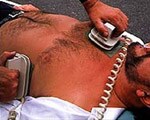Having a mini stroke known as a transient-ischemic attack (TIA), appears to double the risk for a heart attack later.

Although TIA symptoms may last only a few minutes, they are a warning of coronary heart disease that may be unrecognised. TIAs usually occur when a blood clot temporarily blocks a blood vessel to the brain. TIA symptoms are similar to stroke symptoms, but they usually resolve in minutes or a few hours and don't cause long-term disability. They should be treated as a medical emergency warranting immediate evaluation.
According to the American Heart Association, symptoms of a TIA include:
- Sudden numbness or weakness of the face, arm or leg, especially on one side of the body.
- Sudden confusion, trouble speaking or understanding.
- Sudden trouble seeing in one or both eyes.
- Sudden trouble walking, dizziness, loss of balance or coordination.
- Sudden, severe headache with no known cause.
Those under 60 years old who had had a TIA were 15 times more likely to have a heart attack, compared with people who never had a TIA. The average time between a TIA and a heart attack was five years. In addition, TIA patients who had a heart attack were three times more likely to die than those who did not have a heart attack. Factors linked to high heart attack risk after a TIA included being male, older age, and use of cholesterol-lowering drugs.
The study confirms that people who have had a TIA or stroke should also be evaluated for coronary heart disease. In fact, coronary-artery disease is an even greater cause of death after transient-ischemic attack than stroke is, surprising as that may be.
Along with rapid assessment and evidence-based management to prevent stroke, patients with TIA should receive comprehensive measures to prevent and treat coronary artery disease, the researchers recommended.
DoctorNDTV is the one stop site for all your health needs providing the most credible health information, health news and tips with expert advice on healthy living, diet plans, informative videos etc. You can get the most relevant and accurate info you need about health problems like diabetes, cancer, pregnancy, HIV and AIDS, weight loss and many other lifestyle diseases. We have a panel of over 350 experts who help us develop content by giving their valuable inputs and bringing to us the latest in the world of healthcare.












